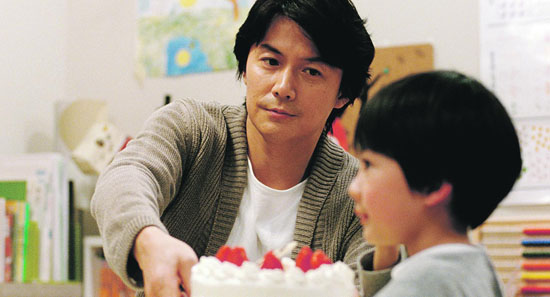 |
|
|
"Like Father Like Son" Photo provided
|
|
|
|
|
|
The switching of two babies at birth is the root of Hirokazu Kore-eda's movie "Like Father Like Son" ("Soshite chichi ni naru," which literally translated means "becoming father after all"). The Japanese director explores the flaws of contemporary Japanese society and offers a philosophical tale that explores what it means to become a father, while portraying two very different social groups and ways of life in contemporary Japan.
 The movie starts in the impeccably structured and controlled world of successful architect Ryoata (played by pop star Masaharu Fukuyama), his wife Midori (Machiko Ono) and their well disciplined 6-year-old son Keita. Their successful and happy life is shattered when the countryside hospital where the young wife delivered her son, calls to tell them their baby was switched at birth. The other family, Yudai (Lily Franky) and Yukari (Yoko Maki) are much less affluent and seem to live in a joyous and somewhat precarious chaos with Ryusei, Ryoata and Midori's biological son, and two younger siblings.
The movie starts in the impeccably structured and controlled world of successful architect Ryoata (played by pop star Masaharu Fukuyama), his wife Midori (Machiko Ono) and their well disciplined 6-year-old son Keita. Their successful and happy life is shattered when the countryside hospital where the young wife delivered her son, calls to tell them their baby was switched at birth. The other family, Yudai (Lily Franky) and Yukari (Yoko Maki) are much less affluent and seem to live in a joyous and somewhat precarious chaos with Ryusei, Ryoata and Midori's biological son, and two younger siblings.
 Had this been an American movie, this discovery of the switch might have instigated violent outbursts and emotional scenes, but Kore-eda is of another school, that of old Yasujiro Ozu. He paints emotions through close-ups, where a single tear forming at the corner of the eye projects more than 20 seconds of sound and fury would, with subtleties similar to those in Masato Harada's movie "Chronicle of My Mother" shown last year as part of the monthly International Film Showcase. Machiko Ono, who plays Midori, the somewhat subdued wife of the successful architect is deftly restrained. Even the two boys, who say very few words, have an almost palpable physical presence that carries a great deal of emotion.
Had this been an American movie, this discovery of the switch might have instigated violent outbursts and emotional scenes, but Kore-eda is of another school, that of old Yasujiro Ozu. He paints emotions through close-ups, where a single tear forming at the corner of the eye projects more than 20 seconds of sound and fury would, with subtleties similar to those in Masato Harada's movie "Chronicle of My Mother" shown last year as part of the monthly International Film Showcase. Machiko Ono, who plays Midori, the somewhat subdued wife of the successful architect is deftly restrained. Even the two boys, who say very few words, have an almost palpable physical presence that carries a great deal of emotion.
 The movie could be perceived as a political tirade. The materialistic world of Ryoata, where broken toys are replaced by new ones and where a father cannot relate to his son, to the tin shack where Yudai repairs everything and everyone bathes together in one bathtub.
The movie could be perceived as a political tirade. The materialistic world of Ryoata, where broken toys are replaced by new ones and where a father cannot relate to his son, to the tin shack where Yudai repairs everything and everyone bathes together in one bathtub.
 But beyond the social portrayal, Kore-eda's movie is a reflection about how to become a father. In an interview for the French newspaper L'Humanité (the movie won the Jury Prize at the 2013 Cannes Film Festival), Kore-eda confirmed that he made the movie to answer the question, how do we become fathers? "The idea of switching the children is a way to ask the questions of the bloodline and of time," he said. "In one of the scenes, one of the mothers, Saiki Yukari, says: 'For you the bloodline is the most important question because you have not bonded with your child.' What fathers are asking is whether their child is like them."
But beyond the social portrayal, Kore-eda's movie is a reflection about how to become a father. In an interview for the French newspaper L'Humanité (the movie won the Jury Prize at the 2013 Cannes Film Festival), Kore-eda confirmed that he made the movie to answer the question, how do we become fathers? "The idea of switching the children is a way to ask the questions of the bloodline and of time," he said. "In one of the scenes, one of the mothers, Saiki Yukari, says: 'For you the bloodline is the most important question because you have not bonded with your child.' What fathers are asking is whether their child is like them."
 The one-week showing of "Like Father Like Son" begins May 2 at the Orinda Theatre. For tickets and showtimes, call (925) 254-9060.
The one-week showing of "Like Father Like Son" begins May 2 at the Orinda Theatre. For tickets and showtimes, call (925) 254-9060.

|
